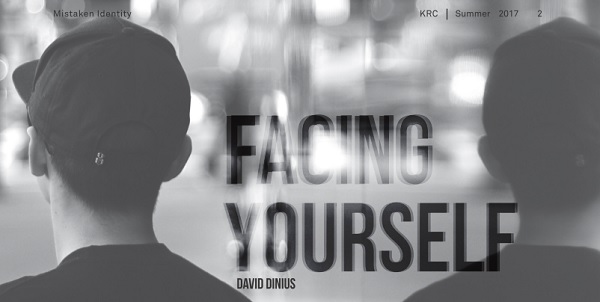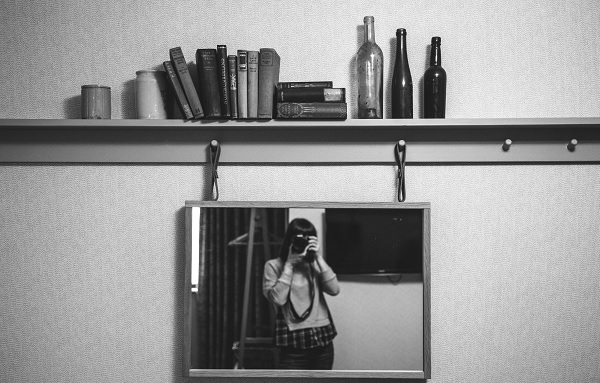Facing Yourself
By David Dinius

The definition of the word imperfection is a fault, blemish, or undesirable feature. Some physical imperfections include thinning hair, a crooked smile, or being overweight. In many situations, imperfections are what make us unique. For instance, heterochromia is a difference in coloration, usually in your eyes but also can be of your skin or hair. This imperfection makes someone particularly uncommon. An example of spiritual imperfection is desiring worldly things over and above God. Arrogance and believing you know more than your peers, being theologically headstrong and confident in your own knowledge but having an empty faith, or puffing up in pride of your fake spiritual awareness are other examples. Most of us feel imperfections are things that keep us from reaching our full potential. In some cases, that is true, like a stutter that hinders someone from becoming an influential speaker. Imperfections are things that can, at times, take us away from what God has intended for us. In other cases, they are what drive us closer to God and move us to reach something we normally wouldn’t believe possible. An example of this is Moses, who was so certain that the Egyptians wouldn’t believe God had sent him to deliver the Israelites because he had a speech impediment that he deemed himself far from being a charismatic mouthpiece. As humans, we are imperfect and we must accept imperfection in ourselves. Despite knowing this basic idea, we seem incapable of accepting imperfection.
Perfection is something that cannot be reached with our own effort, as humans have been imperfect since the fall. Our Father’s desire was for us to dwell on earth in perfect harmony with all creation, abiding in his presence. We were created in the image of God and given reign over everything in existence and told to be fruitful and multiply. We existed in unity with all living beings and were given just one command. We were able to eat of all the fruit in the Garden of Eden except fruit from the tree of the knowledge of good and evil. The penalty for violating this command was death! Our very first imperfection was disobedience to our Father. From this moment on, we were filled with shame and hid from God.
I know my most familiar imperfections are doubt and fear, which lead to insecurity. My self-image is something that I am not confident in. I see myself as undesirable. Socially awkward, physically inferior, absent-minded, and technically challenged in some areas. These ideas inevitably lead me to believe no one can love me the way I am, not even God himself. I begin to let insecurity take control of my emotions and even my actions, and I eventually seek my own joy and pleasure away from God and end up sinning against him. And like Adam and Eve, I hide in shame from others and God.
My imperfections go beyond personal hurt and into how I treat others. I begin to let my imperfections create a perception of myself that isn’t true and I begin to believe people see me in that same false way. With these presuppositions of how strangers and peers view me, I form strong opinions and believe lies I fabricate to myself. In turn, these lies create misunderstanding and conflict. Sometimes I speak thoughtlessly and discourteously. Or in other scenarios, I may speak foolishly and ill-advisedly and perpetuate false information that seems harmless but can have substantial impact. When I believe these lies, I end up treating people based on how I inaccurately view them. I can either let this grow into insecurity and dominate my every thought and action, or I can recognize this behavior and manage myself virtuously and in a way that is honorable to God.
Living with imperfection is the most common element in everyone’s daily life. My own imperfection is something that digs at my soul every single day. I let insecurity rule my self-worth and begin to seek affirmation in things I desire more than God, in things that I think bring me joy and pleasure. Simple things like feeling defeated emotionally can lead to unhealthy eating habits. Inferior feelings can lead me to believe I’m unwanted and I can begin to seek comfort and enjoyment elsewhere, making unstable choices like drinking heavily or indulging in pornography. These decisions only lead me away from God, and I start believing that these feelings of happiness and pleasure are lasting and meaningful. Really, they are just fleeting sensations that are hideous in the sight of God.
Realizing and recognizing objectively how I am is an important part of this process. Self-awareness can ultimately help us understand our imperfections, embrace them and transform them into unique strengths and advantages through the companionship of Christ. Self-awareness is the first step of any kind of growth and improvement.
How can you be self-aware? A simple step would be to take a look in a mirror. Really look at yourself for who you are. Find your strengths and weaknesses. Look for your imperfections. Identify them. Seek to understand yourself. How do you feel? Are you happy with what you see? Joy or depression? Confidence or fear? Doubt or familiarity? Do you view yourself as independent or dependent? A fighter or a pacifist? Do you feel unsatisfied and disappointed in yourself, or do you feel proud and distinguished about who you are? Can you look at yourself with honest intent? When I look at myself, I begin to dissect everything down to the core. This can be dangerous, if you are not ready to seriously evaluate yourself. This gives deep insight into what you are truly feeling, believing, and ultimately seeking within your heart. I am my worst critic, cutting through all of my imperfections.

One example that is dear to me is my love of playing music. Much more than many other things, it is a love that is deeply rooted in my heart. I feel that I’ve been blessed with this gift, but at times I begin to doubt my abilities as a musician. As a member of the worship team, there are moments that I feel my skills as a drummer aren’t good enough to present to a congregation, let alone be worthy in the sight of God. But this isn’t true. When I look at myself with the most honest intent, I see that God has blessed me with this incredible gift. My musicianship may have its imperfections if I compare it to other more adept musicians, but ultimately I understand that I was given this ability with the focus of using it to give God the praise he deserves as my all-providing Father. My uncertainty fades away when my intentional examination uncovers how God views me and wants me to live. I was created to give him the praise and worship he is so worthy of. I am a man after God’s own heart, loved even in my imperfections. Because of God, I am able to overcome the insecurity, fear, and doubts that are motivated by my faults, blemishes, and unwanted features.
Our outward reflection is only part of our representation. Our inner appearance is what echoes loudest to ourselves and is what we should seek to understand most, where we should long for integrity and precision. Jesus said, “Wherever your treasure is, there the desires of your heart will also be. Your eye is like a lamp that provides light for your body. When your eye is healthy, your whole body is filled with light. But when your eye is unhealthy, your whole body is filled with darkness. And if the light you think you have is actually darkness, how deep that darkness is!”1
No matter what our impurities are, whether they are sin, pain, ill will, or defiance, if the deepest desires of our hearts are to know God and to have a relationship with Jesus, our lives will be purified and perfected by the dwelling of the Spirit in the depths of our very souls. Imperfection and insecurity are rendered insignificant and are abandoned in the presence of the only one who was perfect. Jesus takes imperfection and crushes it on the cross. And when we place ourselves in his hands and follow him, we die to our imperfect selves and ultimately gain perfection with Christ in heaven. Imperfections aren’t as scary or intimidating once we make sense out of them. Looking at ourselves in an objective way can be difficult and creates the opportunity for us to perceive ourselves how others would see us. It is also helpful to receive feedback from our peers who can clearly and honestly tell us where our imperfections can be found. Insufficiencies and shortcomings revealed and completely vulnerable, we can finally see where we’ve looked blindly before and observe how and why we are individually created. By knowing that, through Christ, God has made you and is pleased with you, imperfections cease to have a constraint on you and you can embrace who you were created to be. Discover who you are, a beloved child of God, a unique and extraordinary individual with purpose and reason, fulfilled with Christ in your heart, whose perfect love pays for your imperfection.
Whether it be physical inadequacy, mental frailty, spiritual weakness, insecurity, lack of self-control, or sin—whatever our imperfections are, any and all stains to our very being, God still loves us unconditionally. Placing our faith in him wipes away everything that holds us back. We are created anew in Christ Jesus who was the only person who has ever been completely perfect. His perfection didn’t stop him from taking all of our imperfections and bearing them on the cross. Being children of God, we are lifted up by him when we falter. Someone who lives a life without God is someone who lives without clear judgment or sense. But one who abides in Christ and who has Christ abiding in them has unmistakable awareness, judgment, and sense. And with whatever opinion someone has formed of me, I should love them as equally as I love myself.
Once we recognize our faults, blemishes, and undesirable features, we can seek to understand them and displace the imperfection in our lives. It is in a relationship with Christ and with God in the depths of our hearts that imperfection has no hold on us and we are completely free, free to be both imperfect and perfect.


 David Dinius briefly studied graphic design at the Art Institute of Charleston, South Carolina. He has worked in retail, food service, and hospitality while living in Charleston before moving to Boston in pursuit of education at the Berklee College of Music. Unforeseen circumstances changed those plans and soon thereafter he experienced an encounter with God in the summer of 2016 that changed his heart. With a passion for worship leading, he serves as a member of the worship team at Renewal Church in Boston. He plans to study music at Gordon College in the fall of 2018.
David Dinius briefly studied graphic design at the Art Institute of Charleston, South Carolina. He has worked in retail, food service, and hospitality while living in Charleston before moving to Boston in pursuit of education at the Berklee College of Music. Unforeseen circumstances changed those plans and soon thereafter he experienced an encounter with God in the summer of 2016 that changed his heart. With a passion for worship leading, he serves as a member of the worship team at Renewal Church in Boston. He plans to study music at Gordon College in the fall of 2018.